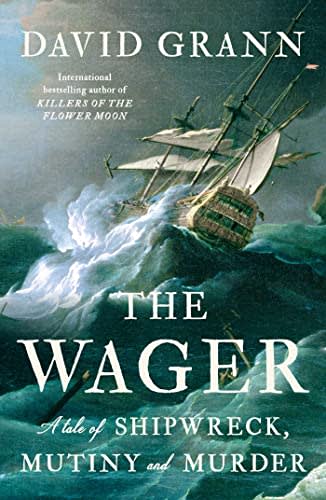My sailing experience is fairly limited, but I do remember a trip in the North Sea as a boy, painfully tacking back and forth as we inched up the Yorkshire coast. Landlubber that I was, I still instinctively knew that asking my dad’s friend (who had built the boat and now captained it) to ‘stick the engine on’ would have been met with scorn and possibly a ‘taste of the cat’.
In the eighteenth century, naval conditions were even more barbaric, as The Wager: A Tale of Shipwreck, Mutiny and Murder by David Grann makes abundantly clear.
What is it about?
The story of a British naval expedition in a war against Spain in the mid 18th century, eight ships left Britain in 1740 with the intention of sailing round the bottom of South America, into the Pacific and capturing one of the fabulously wealthy Spanish treasure ships.
As you might guess, things don’t go entirely to plan - their secret mission is immediately compromised and a powerful Spanish fleet is sent to hunt them down.
They are then decimated by disease and scurvy which kills hundreds of sailors. Finally the storms off Cape Horn at the bottom of South America are so severe that two of the ships have to turn back to avoid being sunk, and one other ship - called the Wager - is badly damaged and blown off course and loses contact with the rest of the fleet.
Non-metaphorical storms
Attempting to make the rendezvous point up the west coast of what is now Chile, the Wager encounters more atrocious weather and is blown onto rocks and shipwrecked on an island off the coast.
Most of the narrative focuses on the 150 sailors stranded on this freezing cold isolated island with little food, no chance of rescue and a rapidly deteriorating relationship between the captain and the rest of the crew.
The captain - David Cheap - ends up getting left behind by the vast majority of his men who have constructed a makeshift vessel by cutting in half and then extending one of the jolly boats that The Wager had on board.
What doesn’t kill you will only make you weaker
In the meantime the sailors are dying like flies, from hunger, the cold, disease, floggings for stealing food and outright murder.
By incredible good fortune a fair number of men from both parties - the mutinous majority and Captain Cheap’s companions1 - make it back to England where they do their best to get each other hanged for the crimes they committed.
Who dun what?
The book is centred around the events on the island but the theme is the contest over the truth. Who was really at fault over their predicament? Was there a mutiny, or just an irreconcilable difference of opinion and a parting of ways?
Naturally each individual considered their own actions entirely reasonable. And with their survival at stake compromise is much harder.
What’s it like to read?
The Wager has the feel of a gripping sea yarn, with the added benefit that it is describing something that actually happened.
As you might expect from a pro wordsmith, Grann’s prose and pacing is excellent, keeping you on the edge of your seat, at times with your jaw on the floor.
But while I enjoyed it throughout I did feel a bit let down by the ending.
No-one can handle the truth
After being built up throughout the whole book: what’s going to happen when they get back home to civilization? Whose version of the truth will win out? Will justice be done or miscarried? In the end... nothing happens. The admiralty basically agree that they will turn a blind eye, never speak of it again, and that’s the end of that!
Which is fair enough as a pragmatic solution to a potentially very damaging situation, but probably shouldn’t have been built up into a ‘grand reveal’ at the end of a story. It is only slightly less of a let down than ‘and it was all a dream’.
Blame game
The other curious thing about this book is that although the theme is a ‘battle for the truth’ there is actually fairly little doubt over what actually happened. Contemporaneous journals basically agree and logbooks corroborate them.
It is less a ‘battle over the truth’, instead a more familiar ‘barney over blame’.
What I most appreciated
Where the book really shined for me was in its portrayal of a ‘floating society’ with representatives from every (male) walk of British life, every age2, and every shade of psychological instability. Exploring what happens when this society, now governed by strict Royal Navy codes, is subjected to extreme stress is a reality TV producer's dream, and Grann does a brilliant job of bringing it to the page.
Buried by sea
The Wager is also a sobering reminder of the extreme peril that accompanied any voyage on the oceans until relatively recently.
The book focuses on the fleet of British ships of which The Wager was one. But you may remember that I mentioned another fleet at the beginning of this review - the Spanish fleet that was sent to find them. The British sailors eventually discover what had happened to their pursuers, sailing under the Spanish admiral Jose Pizarro:
Pizarro’s armada... too, had been almost completely wiped out by storms. One warship with five hundred men had vanished. Another, with seven hundred, had sunk. Because of delays from the weather, the three remaining warships had run out of food—sailors had started catching rats and selling them to one another for four dollars apiece. Most of the seamen had eventually starved to death. And Pizarro, after snuffing out a mutiny and executing three of the conspirators, had ordered his few surviving men to turn back.
David Grann, The Wager
Conclusion
A gripping yarn that actually happened, I found it a great book, just let down a little by the damp squib ending rather than the drama that I felt was promised.
But now I’ve set your expectations on this front, if this sort of thing is in your wheelhouse, I can happily recommend it.
One of whom was John Byron, the grandfather of the more famous Lord Byron. ↩︎
The oldest man was Thomas Maclean who died aged 82 in the makeshift boat as the men attempted to sail back via Brazil. There were also “dozens of boys—some, perhaps, as young as six”. As far as I can tell none of the young children on board the Wager survived. ↩︎
Book details
(back to top)- Title -
The Wager : A Tale of Shipwreck, Mutiny and Murder
- Author -
David Grann
- Publication date -
May 2023
- Publisher -
Simon & Schuster UK
- Pages -
352
- ISBN 13 -
9781471183676
- Podcast episode -
- Amazon UK -
- Amazon US -



